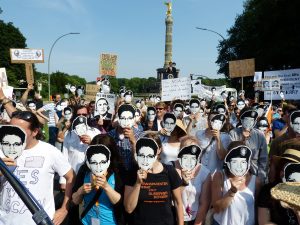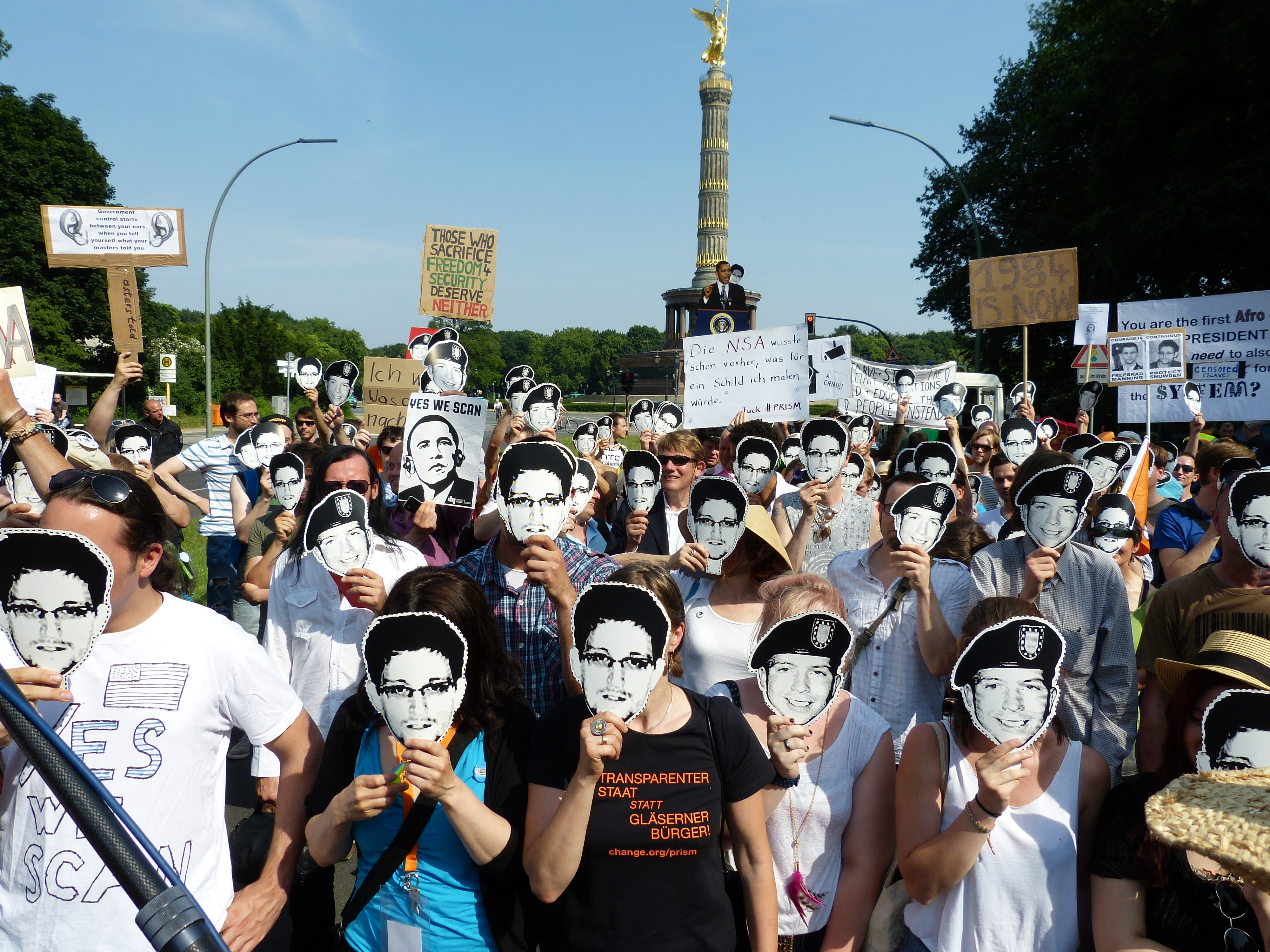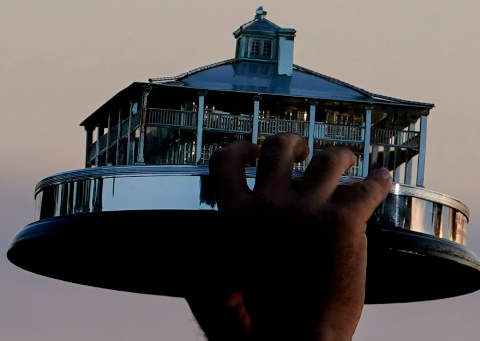By: Rob Oldham

On Dec. 13, 2013, the Honorable Richard Leon, a federal district court judge in Washington D.C., issued an opinion for Klayman v. Obama, declaring the National Security Agency collection of metadata “likely unconstitutional.” Unfortunately, our celebration fizzled out before the New Year, for on Dec. 27, the Honorable Richard H. Pauley III issued his rival opinion from the Southern District of New York in ACLU v. James R. Clapper. Pauley vindicated the NSA snooping and subsequently caused your writer to abandon his Iphone, encrypt his hard drive, and send his always trustworthy Garmin GPS flailing into the frigid depths of Lake Herrick.
The NSA’s collection of massive amounts of metadata is comprised of millions of American citizens’ internet and telephone records and has made headlines since Edward Snowden leaked its details to The Guardian last summer. The spy program is supposedly justified by Section 215 of the 2001 Patriot Act. Essentially, it uses companies with access to large amounts of data (Microsoft, Google, and Verizon) to track Americans’ communications in the name of securing us from terrorism.
Although it is staunchly defended by the Obama administration and centrist members of Congress, an unlikely coalition of pro-privacy advocates has arisen in opposition to the vast amount of power the federal government accrues from spying. The libertarian conservatives and liberal progressives make odd bedfellows, but they have astonishingly come together and are now leading the charge of legal challenges sure to swell the dockets of federal courts for years to come.
Klayman v. Obama was filed by extreme conservative activist and lawyer Larry Klayman last June. Klayman, a Verizon customer, charged the NSA with spying on his phone records without a warrant, constituting a violation of the Fourth Amendment guarantee against unreasonable searches and seizures. Judge Leon, a 2001 George W. Bush appointee, concurred with Klayman; he clearly had fun in his 68 page condemnation of the program. Besides his memorable declaration of the program being “almost Orwellian”, Leon also compared the three telecommunication giants AT&T, Verizon, and Sprint to John Lennon, Paul McCartney, and George Harrison in discrediting the government claim that Klayman had no evidence of Verizon being under surveillance. Omitting these companies, he said, would create an ineffective “Ringo-only database.”
Notwithstanding these humorous asides, Leon’s opinion was primarily built around the Fourth Amendment being violated because all citizens (not just those under suspicion of crime or terrorism) had their personal data collected. However, he stopped short of dismantling the program by only ordering that the data collection on Klayman and his co-plantiff cease, rather than issuing an injunction for the entire program to halt. His inclusion of a wiggle word in calling the spying “likely unconstitutional” implies that Leon was uneasy with making a sweeping decision and instead wishes for a higher court to take on that responsibility.
A couple hundred miles north, the historically liberal American Civil Liberty Union took the NSA to court with similar complaints. The ACLU sought a permanent injunction against the NSA by declaring that its programs, and consequently Section 215 of the Patriot Act, violated the First and Fourth Amendments. The ACLU held that because the NSA kept check on their phone records, it violated their privacy. Judge Pauley, a Clinton nominee, disagreed and sided with the government. He stated that having a massive data collection program in place was a necessary measure in the face of global terrorist networks. He argued that they might have prevented the Sept. 11 attacks. Additionally, Pauley approved of the United States Foreign Intelligence Surveillance Court (FISA) that initially authorized the program, approved secret warrants to investigate individuals, and even issued orders for certain companies to cooperate with the NSA.
Both opinions relied on a Supreme Court precedent set in 1979, Smith v. Maryland. Smith, a burglar, was under surveillance by the police due to his involvement in witness intimidation. Without a warrant, the police implored the phone company to supply Smith’s dialing records and verify that he had placed calls to the witness. After his conviction, Smith appealed that seizing his phone records without a warrant was a violation of his Fourth Amendment rights. In a 5-3 decision the Supreme Court shot Smith down because he voluntarily gave information to a third party (the phone company) and therefore had no reasonable expectation of privacy.
Pauley agreed with the precedent and extended the same logic to the millions of Americans who place phone calls and download internet data every day. Because everyone willingly hands over their personal information to companies, they should understand that these corporations have the authority to turn the data over to the police. Moreover, because the NSA would only specifically dissect the information of suspected criminals and terrorists, along with the protection of Congressional and FISA oversight, the normal citizen has nothing to fear.
Leon also agreed with the initial ruling in Smith; however, he did not think it applied to a mass collection of data. He emphasized the differences of circumstances between the two instances, namely the mass collection of data as opposed to criminals being singled out, the widespread use of cell phones, and the possibly illicit relationship between the NSA and communications companies. “When do present-day circumstances become so thoroughly unlike those considered by the Supreme Court thirty four years ago that they do not apply?” he asks. “The answer, unfortunately for the government, is now.”
Both Klayman and ACLU deputy legal director Jameel Jaffer believe their cases will eventually find their way through the appellate process to the Supreme Court and that a definitive decision will be reached on the NSA programs. However, possible impediments are arising. Klayman charges the government with drawing out their appeal process in his case in order to buy time for the more favorable Pauley opinion to reach the Supreme Court first. To counter this, he is attempting to avoid the Court of Appeals and have the Leon opinion sent directly to the Supreme Court for review. Other observers doubt that the Supreme Court will even agree to hear the case due to actions by the legislative and executive branches. Rumors are abounding that Congress or the Obama Administration may change the program authorization enough so that neither opinion applies, making any Supreme Court ruling irrelevant. President Obama is scheduled to hold a press conference on Jan. 17, where he will outline reforms to the program.
Change, or at least justification, is close at hand for the NSA’s spying practices, although it is unclear whether it will come from legal principle in the form of a Supreme Court ruling or through the more publicly responsive Congress and Presidency. Either way, Americans must be attentive to shifting balances of power as the different branches of government check each other’s actions and try to determine the fate of NSA’s spy programs through their own unique processes. More importantly, Americans must be selective and deliberate when accepting or disavowing the concentration of power in an agency like the NSA. Thomas Jefferson warned that “even under the best forms of government, those entrusted with power have, in time, and by slow operations, perverted it into tyranny.”
Your writer refuses to accept that the United States is becoming of tyranny.


